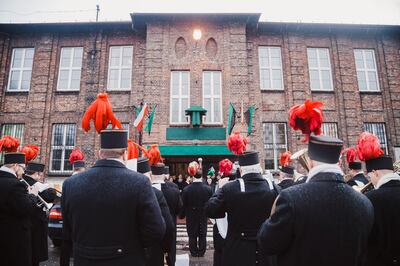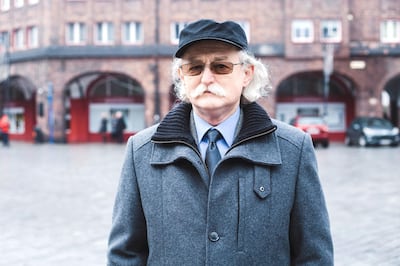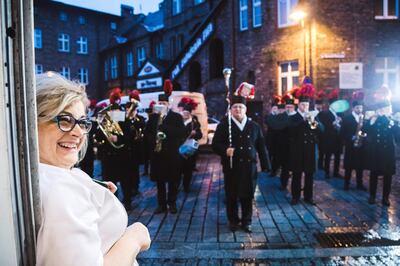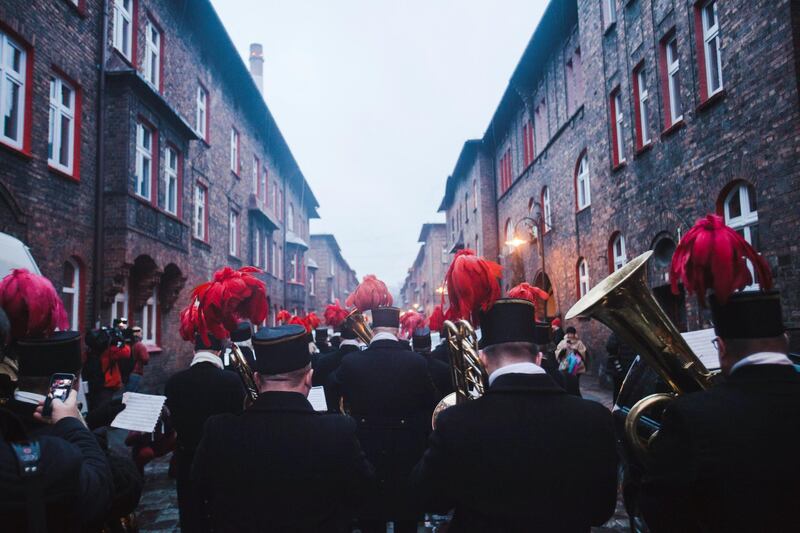A stagnant winter’s morning in Nikiszowiec is abruptly interrupted as the local orchestra begins a haphazard tune-up.
With instruments ready, they begin a march across town, the brassy echo bouncing off soot-stained red-brick archways and upwards into the thick grey clouds.
On St Barbara’s day, towns across Poland pay tribute to the patron saint of miners. Orchestras sponsored by the area’s numerous pits get going before dawn and towns across Europe’s coal heartland are awoken by the screech and rhythm of brass.
Towns like Nikiszowiec, and the communities that inhabit them, are literally built around the coal mines, many owe their existence to what the locals still call “black gold”.
For years, coal meant that Silesia has been the economic engine of Poland. A 2008 study noted that at its peak, 60 of Poland’s 73 coal mining communes were located here. But those days are gone and the industry can no longer be taken for granted.
The town’s red-brick terrace houses were built by the communist government for miners in the 1970’s and many who still live here can trace back generations of their families, grandfathers, great-great-grandfathers and the like, who toiled in the mines far beyond that. It is a legacy they are immensely proud of.

The town’s blackened beating heart was the Wieczorek mine shaft, which directly employed some 6,000 people at its peak. However, it recently closed. The holding company claimed it was no longer profitable and now the towering spire of its decommissioned crane looms over the horizon.
Locals know the industry is dying under a variety of pressures. The strong Polish union movement has historically kept mining one of the best-paid jobs in the country, denting profitability at a time when world coal prices have sunk to record lows in recent years. Poland has starting to import far cheaper coal from Russia, but that does not mean locals in Nikiszowiec accept it.
There has been environmental pressure too. This year’s St Barbara’s day coincided with the beginning of the UN’s global climate summit – COP24 – in Katowice, another city built on mining, just down the road
The UN Secretary-General Antonio Guterres and even Hollywood actor turned California governor, Arnold Schwarzenegger have flown in from across the globe in a bid to save a deal on climate change agreed in Paris in 2015. The withdrawal of the US and the lack of enforcement mechanisms, as well as new data showing Co2 levels still surging, worries backers of the bill.
Marian Badura, 68, spent thirty years down the mine, starting out as a labourer and eventually rising to become supervisor of the whole shaft. He quips that retirement, and more specifically his grandchildren, has kept him busier than the mines ever did.

Yet, despite his lifelong investment in the pits, he acknowledges that change is inevitable. “Progress is something that we cannot stop, when I was a kid there were only two cars in the town, right now there is no place to park.
“My grandfather, my father and I used to work down there together. We left a lot of our health in the mine. I put a lot of heart into my job”.
But he is sceptical that solutions can be found at the Katowice summit. “There are a lot of politicians, companies and lobbyists [at COP24], they all say the Co2 is poisoning both the environment and people, but when you think about the natural gas that they are happy about – it’s just as bad”.
Others aren’t so understanding, Krzysztof plays trumpet in the orchestra, and still has his job in a nearby shaft, though likely not for much longer. He is in no doubt this will be the last celebration of St Barbara’s day – the orchestra will conclude when the shaft is closed.
He says the blame lies overseas. “Polish mining, just like British mining, was over-exhausted by the European Union and we are really starting to consider Pol-Exit.”
Some might find jobs in other mines, but for many, there simply isn’t the capacity to transfer.
“There are other mines, but those mines already have miners. We can’t squeeze every miner from here into another mine, some will be re-allocated, but there is not enough space for everyone in other mines,” he says
It is not just the economics that has put locals in a difficult position, the closure of mines across Silesia has challenged the social fabric of communities throughout the region.
Grazyna Pawelczyk’s bakery is one of the few traditional businesses in town that has outlived the local shaft. As miners stream out of the church following mass at the end of their parade, they head to her bakery, sweet pastries and fresh loaves await.
“It’s tragic, the mine closures have had such an influence. This is not a mining community anymore, there are more and more people who don’t work in the mines – they just have office jobs,” she says. “It’s not like in the old days, everybody used to know everybody, we would say hello to each other, right now there are a lot of strangers.”
Her husband’s grandfather helped set up the orchestra over 100 years ago, the parade even pauses outside her bakery to play her family a brief ode, something she films on her smartphone.

She reminisces about the days when she knew every customer by name.
“You don’t know the people who live next door, it’s just like the big cities,” she says.
Whilst she is fiercely defensive of the local industry, Ms Pawelczyk recognises that something needs to be done about the climate.
“COP24 is a very good thing, let’s do something about the climate, let’s change it, let’s make some great decisions about it,” she says. “I’m not happy about shutting down mines, it’s the worst of evils.
“We still have a lot of richness down there, it’s nonsense because we know will import the same stuff from elsewhere.”
______________
Read more:
German astronaut urges action on climate change
Civilisations and natural world on brink of collapse, David Attenborough warns
Opinion: Climate change denial is just the latest example of Trump's post-truth presidency
______________
Yet, even among those who are the most committed to closing down the mines, and bringing cleaner energy to Poland, there is deep concern that these communities are being left behind by the government.
Bohdan Pekacki, country director for Greenpeace, warns that the government has a responsibility to those it hopes to put out of work.
“There is a lot of sentimentality over the industry,” he says. “The transition away from coal is happening, just look at the numbers – there are fewer miners and fewer mines, we have to make sure this is a just transition.
“There is a lot of talk coming from the government, but I’m not sure they are being fair to the miners right now… They are not telling the truth.”
Indeed, recent claims from the country’s economic ministry that the country had another 200 years of coal reserves left to exploit appears at odds with Poland’s aspirations to lead the world in the production of green energy and to ween whole communities off their economic dependence on Silesia’s coal fields.
“They tell the UN one thing, and the miners another,” Mr Pekacki adds.
There is a reluctant acceptance in Nikiszowiec that the mining community is in its twilight. Economics and a youthful population acutely aware of the environmental consequences of fossil fuels are driving Polish society away from an industry that until recently was its bedrock.
Yet, this is matched by a cold stubbornness to preserve the mining communities that built Silesia and stave off mass unemployment. When Messrs Guterres and Schwarzenegger leave, this soot darkened corner of Poland will still be searching for a happy medium.







